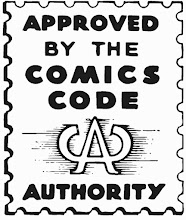The best series you've never read
Marvelman was a British knock-off of Fawcett's Captain Marvel and was devised by writer Mick Anglo to take Cap's place when Fawcett discontinued the title after a lawsuit from DC Comics. So to be frank, the only reason that Marvelman was created was an economical one. The UK publisher wanted to continue publishing comic books and they had just lost their major star...so why not make one up.
Marvelman was very similar to Captain Marvel: a young reporter named Micky Moran encounters an astrophysicist (instead of a wizard) who gives him his superpowers based on atomic energy. To transform into Marvelman, he has to speak the word "Kimota" (phonetically, "atomic" backwards; rather than "Shazam"). Readers didn't seem to mind and this humdrum title sold fairly well in the UK in the mid-fifties.
Fast-forward to March 1982, "Warrior"a new British monthly black-and-white anthology comic is launched.The first 21 issues feature a new Marvelman story written by Alan Moore, predating Watchmen by a few years, Moore touches on many themes of his later work, including the superhero as a source of terror, the sympathetic villain, and exploring the mythology of an established fictional character.The result is fantastic. The new Marvelman is a fabulous comic-book series, very complex, very layered and quite disturbing.
In August 1985, US comic book publisher Eclipse begins reprinting the Marvelman stories from Warrior, colorized and re-sized. However, they were renamed and re-lettered throughout as Miracleman, due to pressure from Marvel Comics. Issues 1-6 reprinted all the Warrior content, after which Eclipse began publishing all-new Miracleman stories from Moore and new artist Chuck Austen, soon replaced by Rick Veitch and then John Totleben.
Alan Moore continues to write the series up to #16 and ends with a bang, the fight scene is #15 is highly disturbing, featuring a degree of violence not previously seen in superhero battles and let's not forget the even more disturbing beating and rape of Kid Miracleman. In fact Miracleman #15 can be seen as the very first "grim and gritty" comic that led to a real avalanche of the genre during the 90's and the subsequent comic-boom.
Neil Gaiman picked up the series at #17, and developed it further in the 1990s, working with artist Mark Buckingham. He planned three books, consisting of six issues each; they would be titled "The Golden Age", "The Silver Age" and "The Dark Age".
Two issues of "The Silver Age" appeared, but issue #24 was the last to see print. Issue 25 was completed (apart from colouring) but due to the collapse of Eclipse it has never seen light.
So now you think, well some other publisher will continue where Eclipse left off and finish the run...well no such luck. Marvelman/Miracleman has been tied up in courts for over a decade. The legal ownership of Miracleman is a complicated story and until it's resolved there will be no more issues...worse still no reprints. And that's why I chose the title of this little blog-entry, it's a crime that so many comic-fans have been deprived of the chance to read one of the best comic series that has ever been made. Both Moore and Gaiman turned out some of their best work here and it should be enjoyed by all comic fans.
I know that a lot of comic fans are a lot smarter than I am and don't go around spending tons of cash of cash on back issues, but instead opt to buy a new TPB or hardcover which reprints the story...well even that is impossible. The few TPBs that were released before all the litigation started have become even rarer than the original issues and some command prices between $100 and $350 on eBay...for what are essentially reprints.
The first few issues aren't that hard to find or that expensive, but expect to pay about $350 - $500 for a decent complete run (1-24)
So let's hope one day the whole mess gets cleared up and the epic story that is Miracleman can be reprinted and discovered and enjoyed by everyone.
Meanwhile here are some of the covers. I finally managed to complete the series, it took me a few years and two years ago I was just short of issues #20 and #24 and for some reason I just couldn't get them...Mission accomplished and now for the first time ever I'll be able to read the story from beginning till the end. I was lucky to find two of the TPBs here in Belgium about 5 years ago but I've never read the story in true comic book form.
Labels: Alan Moore, comic book, Marvel, Marvelman, Miracleman, Neil Gaiman

